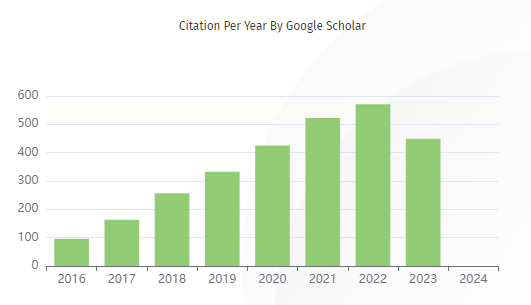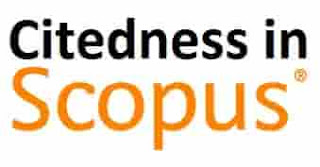Pengaruh Alturisme, Reputasi dan Balas Jasa terhadap Aktivitas Berbagi Pengetahuan Akademisi pada Komunitas Virtual: Studi Kasus Group Facebook Dosen Indonesia
DOI:
https://doi.org/10.12695/jmt.2015.14.2.4Abstract
Abstrak: Penelitian ini bertujuan untuk menyelidiki pengaruh tiga elemen alturisme, reputasi, dan balas jasa terhadap aktivitas berbagi pengetahuan yang dilakukan oleh para akademisi melalui social media. Sebuah model penelitian dan tiga buah hipoteses dikembangkan dalam penelitian ini. Model dan hipoteses kemudian diuji dan divalidasi menggunakan data yang diperoleh dari sebuah survey yang dilaksanakan secara online. Survey secara online dilakukan pada sebuah grup dosen di Indonesia. Dari 115 kuesioner yang diisi oleh anggota komunitas online tersebut 75 kuesioner dinyatakan valid dan digunakan untuk analisis lebih lanjut. Data yang diperoleh dianalisis menggunakan Partial Least Square (PLS) memanfaatkan perangkat lunak Smart PLS V2. Hasil dari pengolahan data mengindikasikan bahwa alturisme mempunyai pengaruh yang positif terhadap aktivitas akademisi dalam berbagi pengetahuan di komunitas virtual, sedangkan balas jasa dan reputasi tidak memiliki hubungan yang signifikan terhadap aktivitas berbagi pengetahuan mereka.
Kata kunci: Berbagi Pengetahuan, Sosial Media, Akademisi, Alturisme, Balas Jasa, Reputasi
Â
Abstract: The aim of this research is to investigate the relationship between alturisme, reputations, and reciprocity elements with academician knowledge sharing activity in social media. A research model was developed with three hypotheses for this study. Research model and hyphotheses next was examined and validated using data collected from online survey. Online survey was conducted in one of Indonesia academic virtual group. One hundred and fifteen quetionnaires collected from the survey and seventy five questionnaires were valid and use for next analyisis. Data collected from the survey was analyzed with Partial Least Square (PLS) using Smart PLS V2. The result from data analyisis indicated that alturism element has positive affect to academician knowledge sharing activity in virtual community; however this study reveals that there is no significant relation between reciprocity and reputation with academician knowledge sharing activity in virtual community.
Keyword: Knowledge Sharing, Social Media, Academician, Alturism, Reciprocity, Reputation
Downloads
References
Ardichvili, A., Page, V., & Wentling, T. (2003). Motivation and barriers to participation in virtual knowledge-sharing communities of practice. Journal of knowledge management, 7(1), 64-77.
Bartol, K. M., & Srivastava, A. (2002). Encouraging knowledge sharing: The role of organizational reward systems. Journal of Leadership & Organizational Studies, 9(1), 64-76.
Bock, G.-W., & Kim, Y.-G. (2001). Breaking the myths of rewards: An exploratory study of attitudes about knowledge sharing. Pacis 2001 proceedings, 78.
Bock, G.-W., Zmud, R. W., Kim, Y.-G., & Lee, J.-N. (2005a). Behavioral Intention Formation in Knowledge Sharing: Examining the Roles of Extrinsic Motivators, Social-Psychological Forces, and Organizational Climate. MIS Quarterly, 29(1), 87-111.
Bock, G.-W., Zmud, R. W., Kim, Y.-G., & Lee, J.-N. (2005b). Behavioral intention formation in knowledge sharing: Examining the roles of extrinsic motivators, social-psychological forces, and organizational climate. MIS quarterly, 87-111.
Boudreau, M.-C., Gefen, D., & Straub, D. W. (2001). Validation in information systems research: a state-of-the-art assessment. Mis Quarterly, 1-16.
Chin, W. W. (1998). The partial least squares approach for structural equation modeling. In Modern methods for business research (pp. 295-336). Mahwah, NJ, US: Lawrence Erlbaum Associates Publishers.
Chin, W. W. (2010). How to Write Up and Report PLS Analyses. In V. Esposito Vinzi, W. W. Chin, J. Henseler and H. Wang (Eds.), Handbook of Partial Least Squares (pp. 655-690): Springer Berlin Heidelberg.
Chiu, C.-M., Hsu, M.-H., & Wang, E. T. (2006). Understanding knowledge sharing in virtual communities: An integration of social capital and social cognitive theories. Decision support systems, 42(3), 1872-1888.
Fang, Y.-H., & Chiu, C.-M. (2010). In justice we trust: Exploring knowledge-sharing continuance intentions in virtual communities of practice. Computers in Human Behavior, 26(2), 235-246.
Fornell, C., & Larcker, D. F. (1981). Evaluating structural equation models with unobservable variables and measurement error. Journal of marketing research, 39-50.
Gal-Oz, N., Grinshpoun, T., Gudes, E., & Friese, I. (2010). TRIC: An infrastructure for trust and reputation across virtual communities. Paper presented at the Internet and Web Applications and Services (ICIW), 2010 Fifth International Conference on, 43-50.
Haefliger, S., Monteiro, E., Foray, D., & Von Krogh, G. (2011). Social software and strategy. Long Range Planning, 44(5), 297-316.
Hemsley, J., & Mason, R. M. (2013). Knowledge and knowledge management in the social media age. Journal of Organizational Computing and Electronic Commerce, 23(1-2), 138-167.
Hildreth, P., Kimble, C., & Wright, P. (2000). Communities of practice in the distributed international environment. Journal of Knowledge management, 4(1), 27-38.
Hsu, C.-L., & Lin, J. C.-C. (2008). Acceptance of blog usage: The roles of technology acceptance, social influence and knowledge sharing motivation. Information & management, 45(1), 65-74.
Kankanhalli, A., Tan, B. C., & Wei, K.-K. (2005). Contributing knowledge to electronic knowledge repositories: an empirical investigation. MIS quarterly, 113-143.
Kaplan, A. M., & Haenlein, M. (2010). Users of the world, unite! The challenges and opportunities of Social Media. Business horizons, 53(1), 59-68.
Koh, J., & Kim, Y.-G. (2004). Knowledge sharing in virtual communities: an e-business perspective. Expert systems with applications, 26(2), 155-166.
Lin, H.-F. (2007). Effects of extrinsic and intrinsic motivation on employee knowledge sharing intentions. Journal of information science.
Ma, W. W., & Chan, A. (2014). Knowledge sharing and social media: Altruism, perceived online attachment motivation, and perceived online relationship commitment. Computers in Human Behavior, 39, 51-58.
Meihami, B., & Meihami, H. (2014). Knowledge Management a way to gain a competitive advantage in firms (evidence of manufacturing companies). International Letters of Social and Humanistic Sciences(03), 80-91.
Pangil, F., & Moi Chan, J. (2014). The mediating effect of knowledge sharing on the relationship between trust and virtual team effectiveness. Journal of Knowledge Management, 18(1), 92-106.
Park, J.-G., & Lee, J. (2014). Knowledge sharing in information systems development projects: Explicating the role of dependence and trust. International Journal of Project Management, 32(1), 153-165.
Razmerita, L., Kirchner, K., & Nabeth, T. (2014). Social media in organizations: Leveraging personal and collective knowledge processes. Journal of Organizational Computing and Electronic Commerce, 24(1), 74-93.
Ryan, R. M., & Deci, E. L. (2000). Intrinsic and extrinsic motivations: Classic definitions and new directions. Contemporary educational psychology, 25(1), 54-67.
Ryan, R. M., & Deci, E. L. (2008). Self-determination theory and the role of basic psychological needs in personality and the organization of behavior. In O. P. John, R. W. Robbins, & L. A. Pervin (Eds.), Handbook of Personality: Theory and Research (pp. 654-678). New York: The Guilford Press.
Snyder, W. M., & Wenger, E. (2010). Our world as a learning system: A communities-of-practice approach. In Social learning systems and communities of practice (pp. 107-124): Springer.
Sun, Y., Fang, Y., & Lim, K. H. (2012). Understanding sustained participation in transactional virtual communities. Decision Support Systems, 53(1), 12-22.
Wang, S., Noe, R. A., & Wang, Z.-M. (2014). Motivating Knowledge Sharing in Knowledge Management Systems A Quasi–Field Experiment. Journal of Management, 40(4), 978-1009.
Wasko, M. M., & Faraj, S. (2005a). Why should I share? Examining social capital and knowledge contribution in electronic networks of practice. MIS quarterly, 35-57.
Wasko, M. M., & Faraj, S. (2005b). Why Should I Share? Examining Social Capital and Knowledge Contribution in Electronic Networks of Practice. MIS Quarterly, 29(1), 35-57.
Downloads
Submitted
Accepted
Published
How to Cite
Issue
Section
License

This work is licensed under a Creative Commons Attribution-NonCommercial-ShareAlike 4.0 International License. Copyright @2023. This is an open-access article distributed under the terms of the Creative Commons Attribution-NonCommercial-ShareAlike 4.0 International License (http://creativecommons.org/licenses/by-nc-sa/4.0/) which permits unrestricted non-commercial used, distribution and reproduction in any medium.

















